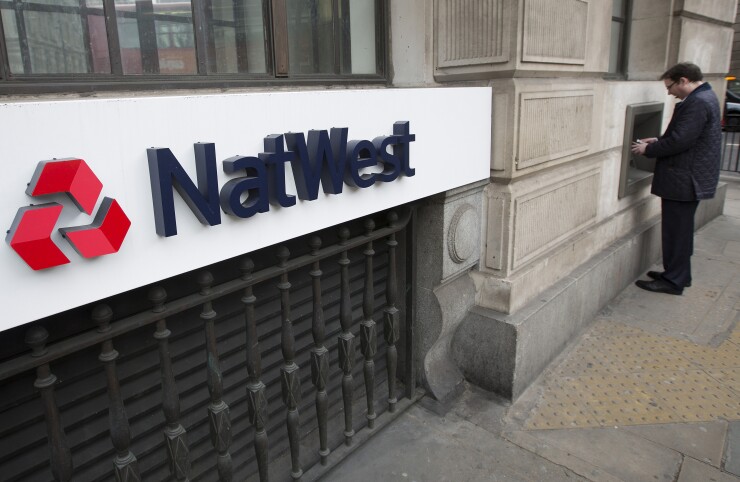The information you need to start your day, from PaymentsSource and around the web:
Office space
The pandemic has pushed many office workers off site long enough to change fundamental habits such as
London fintech Revolut has formed labs that will take up about 70% of its office footprint. These labs will be dedicated to collaboration and project development, with staff maintaining most of the control over whether they work from home or the office on a day to day basis. The labs will also accommodate a mix of remote and in-person access, but will primarily focus on group work and teams rather than individuals at desks or cubicles.
Revolut's internal research found 98% of the company's 2,000 employees have adapted well to remote work, and 90% of team leaders saying performance is unaffected. But 65% of staff wanted the option to come into an office on occasion to discuss ideas in person or simply because they miss their colleagues.
Network battle
NatWest is converting its U.K. debit cards to Mastercard, giving the card brand a win over Visa in the U.K. as Mastercard tries to cut into Visa's lead.
The deal includes Natwest and affiliated brands Royal Bank of Scotland, Ulster Bank and Coutts, with a total of 16 million cards, reports
Mastercard's debit network in Europe now reaches 200 million consumers and 43 million locations in-store, online and in-app.

Power play
Cryptocurrency is notorious for
Bitcoin production uses 118 Kilowatt hours (KWh) per transaction, reports
By comparison, Visa, Mastercard, and Facebook's Libra/Diem burn about 0.006 KWh per transaction; and Ripple burns even less at 0.000013 KWh. Part of the reason is Ripple requires less data than cryptos like bitcoin, but conversely processes much fewer transactions than the card networks. Visa processes 65,000 transactions per second, Mastercard 45,000 and Ripple 1,700. China's central bank digital currency, which is still in pilot, processes 300,000 transactions per second.
Pilot lands
London payment technology startup Flux has ended its digital receipt test with Barclays, with the product formally launching for all U.K. bank customers.
Flux digital bills are available on an opt-in basis for Barclays debit card holders on the mobile banking app, according to
Barclays has also taken a minority stake in Flux, which went through Barclays' accelerator in the startup's early stages.
From the web
TECHCRUNCH | February 5, 2021
PayPal is shutting down its domestic business in India, less than four years after the American giant kickstarted local operations in the world’s second largest internet market.
TECHCRUNCH | Friday, February 5, 2021
Djamo, a financial super app for consumers in Francophone Africa, is the first startup from Ivory Coast to get backing from Y Combinator.
COINDESK | Friday, February 5, 2021
The Reserve Bank of Australia has delivered somewhat dismissive comments on bitcoin at a meeting of the House of Representatives Standing Committee on Economics.
More from PaymentsSource
People are reluctant to use physical point of sale terminals, putting biometrics in the middle of the contactless payment wave, says Fingerprints' Christian Fredrikson.
Visa and partners fast-tracked the big game's digital overhaul as the pandemic caused a sharp spike in demand for contactless payments.
Even at limited capacity, sporting events remain a hotbed for payment innovation. In years past, Super Bowls, Olympics and smaller events have experimented with ways to streamline payments for large crowds. This year the crowds may be smaller, but there's the added imperative to accommodate social distancing and contactless payments.
American Express is tweaking the rewards on its Gold card as the credit card company strives to hold onto affluent customers.
JoomPay has launched a new P2P service for money transfers across Europe, operating as a socially focused spinoff of the Joom e-commerce marketplace.
Paying suppliers can be a major pain point for any business — especially in the age of COVID and remote work requirements. Add in international suppliers that send invoices in different currencies and want to be paid accordingly, and you have an even stickier problem.
Major projects like Diem are moving crypto beyond its fan base, according to Icon Solutions' Simon Wilson.
Key to PayPal's successful year were its support for buying and selling cryptocurrencies; and its entry into the buy now/pay later market.
Vast Bank in Oklahoma is one of the first to allow customers to purchase digital currencies, a market that has proved lucrative for fintechs.
Balance, an API-based checkout solution designed for B2B e-commerce, has raised $5.5 million to launch operations with backing from Lightspeed Venture Partners, Stripe, Affirm and PayPal cofounder Max Levchin.





